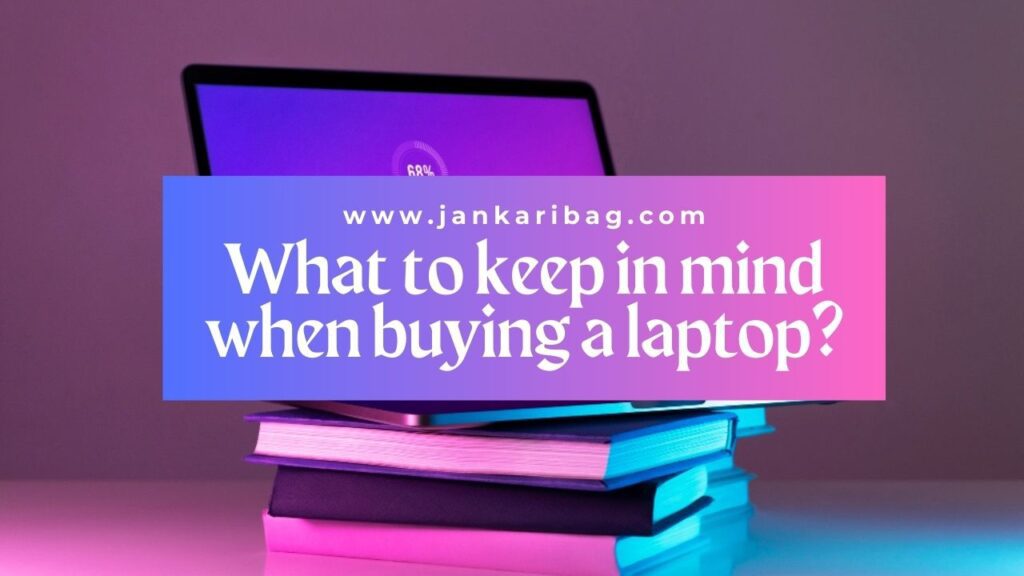Buying a laptop: Choosing a laptop can be confusing, especially with so many options available in the space.
Whether you’re a student, a professional, or someone who wants to browse the web, understanding your needs and knowing what to look for can help you make the right decision.
Here’s a detailed guide to help you navigate when buying a laptop.
Determine Your Purpose of Buying a Laptop
Before going deep into specifications, think about what you’ll primarily use your laptop for. Here are some common uses:
- Basic Tasks: If you only need a laptop for browsing the internet, checking emails, or streaming videos, a basic model with lower specs will suffice.
- Office Work: For tasks like word processing, spreadsheets, and presentations, look for a mid-range laptop with a comfortable keyboard and decent performance.
- Gaming: Gamers need high-performance machines with dedicated graphics cards, ample RAM, and fast processors.
- Creative Work: If you’re into graphic design, video editing, or music production, choose a laptop with a powerful processor, plenty of RAM, and a high-resolution display.
Set Your Budget
Laptops (buying a laptop) come in a wide range of prices, so it’s crucial to set a budget before you start shopping. Keep in mind that while you don’t need to break the bank, spending a little more can often mean better performance and longevity.
Consider additional costs for software, accessories, and warranties when calculating your budget.
Choose the Right Operating System When Buying a Laptop
The operating system (OS) you choose can significantly affect your user experience. Here are the main options:
- Windows: Great for gaming and business applications, offering a vast software library.
- macOS: Ideal for creative professionals and those already in the Apple ecosystem.
- Chrome OS: A lightweight option perfect for browsing and using web apps, but less suitable for resource-heavy tasks.
- Linux: A good choice for developers and those looking for customization and open-source options.
Consider Size and Portability When Buying a Laptop
Laptops come in various sizes, typically ranging from 11 to 17 inches. Think about your lifestyle and how often you’ll need to carry your laptop:
- Ultraportables (11-13 inches): Lightweight and easy to carry, great for travel but often limited in power.
- Mid-size (14-15 inches): A balance between portability and usability, suitable for most users.
- Large (17 inches and up): Ideal for gaming or design but can be cumbersome to transport.
Look at Key Specifications
Here are the essential specs to consider when buying a laptop:
- Processor (CPU): The brain of your laptop. Intel and AMD are the main players. Look for at least an Intel i5 or AMD Ryzen 5 for general use.
- RAM: More RAM means better multitasking. Aim for at least 8GB, but 16GB is ideal for gaming or professional use.
- Storage: Decide between HDD and SSD. SSDs are faster and more reliable, while HDDs offer more storage for a lower price. A combination of both can provide a good balance.
- Graphics Card (GPU): For gaming or graphic-intensive work, a dedicated GPU is essential. If not, integrated graphics are fine for basic tasks.
Display Quality
Buying a laptop: The display impacts your overall experience. Consider the following factors:
- Resolution: Look for at least a Full HD (1920 x 1080) display. Higher resolutions, like 4K, are excellent for creative work but drain battery life faster.
- Screen Type: IPS panels offer better color accuracy and viewing angles compared to TN panels. If you’re working with graphics, this is essential.
- Touchscreen: A touchscreen can be handy for some users, especially in 2-in-1 laptops.
Battery Life
If you plan to use your laptop on the go, battery life is crucial. Aim for a laptop that can last at least 8 hours on a single charge.
Read reviews to get an accurate idea of real-world battery performance, as manufacturer claims can sometimes be misleading.
Keyboard and Touchpad
Comfort is key when using your laptop for long periods. Check for:
- Keyboard Quality: Look for a laptop with a comfortable and responsive keyboard. If possible, try typing on it before purchasing.
- Touchpad Size and Sensitivity: A smooth and accurate touchpad can enhance your user experience, especially if you don’t use a mouse.
Connectivity Options
Ensure your laptop has enough ports for your needs. Common ports to look for include:
- USB-C: For fast data transfer and charging.
- USB-A: Standard USB ports for connecting older devices.
- HDMI: For connecting to external displays.
- Headphone Jack: A must for audio devices.
Warranty and Support
Important: Don’t overlook the warranty and customer support options. A good warranty can save you money in the long run.
Research the manufacturer’s reputation for customer service, as this can make a significant difference if you encounter issues.
Final Words
Buying a laptop is an important investment, and taking the time to understand your needs and the available options will help you find the perfect device.
By keeping these factors in mind, you’ll be well on your way to choosing a laptop that fits your lifestyle and enhances your productivity. Happy shopping!
Thank you for visiting Jankaribag.com. We hope you find our content useful and enjoyable. If you have any questions or suggestions, feel free to contact us.










